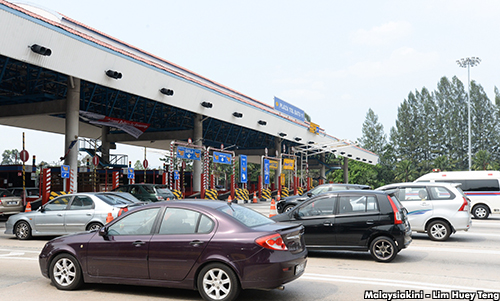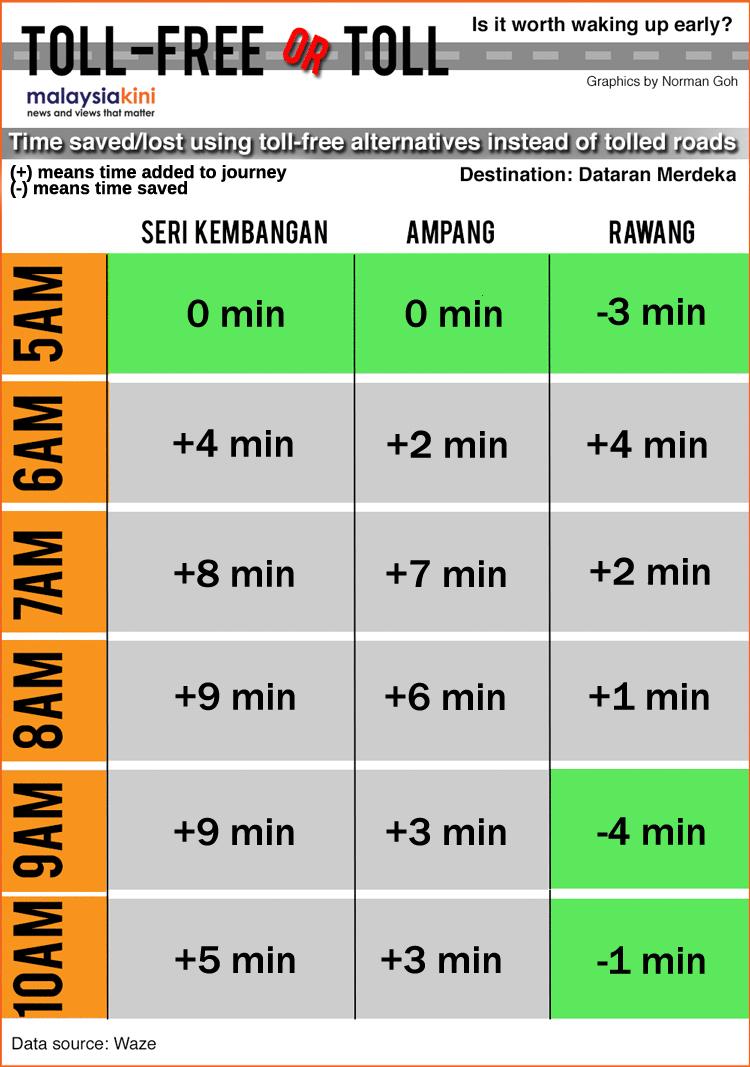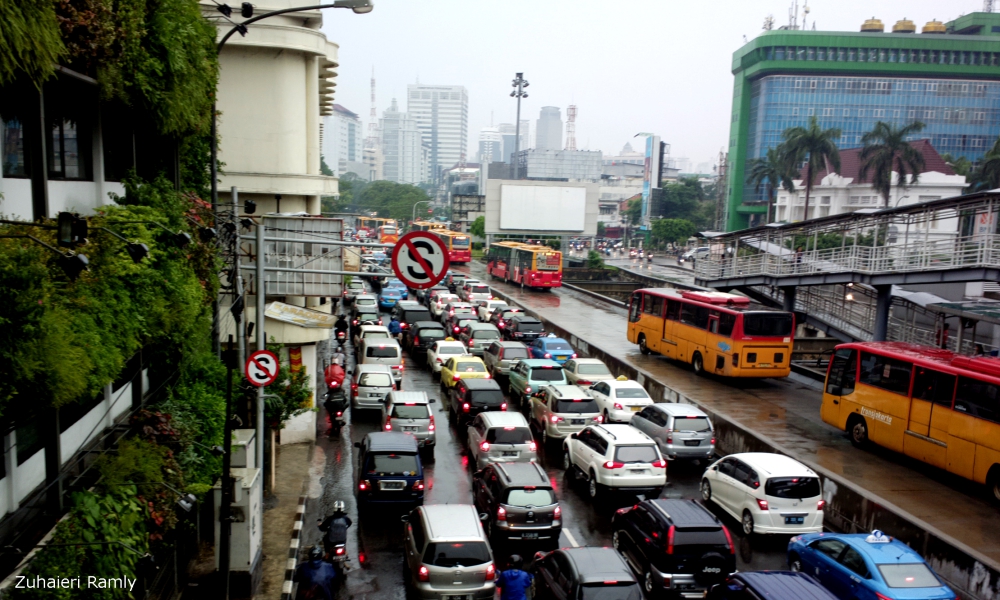Netizens this week rained scorn on federal minister Abdul Rahman Dahlan for telling motorists to wake up early and use toll-free alternative roads - which can quickly become congested during the rush hours - if they want to avoid paying highway tolls.
Malaysiakini decided to give Rahman the benefit of the doubt by putting his advice to the test. Just how early would you need to wake up in order to use toll-free roads without having to pull your hair out?
For this test, Malaysiakini set up three hypothetical commutes, each heading towards Dataran Merdeka in the heart of Kuala Lumpur.
The three starting points were Taman Uda Jaya in Ampang, Taman Sungai Besi Indah in Seri Kembangan and Taman Bersatu, all the way in Rawang.
Using Thursday's (Nov 5) crowdsourced traffic data from navigation service Waze , Malaysiakini was able to obtain the estimated travel time at various hours of the morning.
The times were based on the best tolled and toll-free options to reach our destination at various hours, which may include a combination of highways or roads.
As it turned out, if you're living in the tested areas, you will need to be on the road by 5am - that means waking up earlier than that - if you want better, or at least the same travel times, on toll-free roads.
Of the three places, people in Rawang would stand to gain the most from getting up early and leaving by 5am, saving an estimated 24 minutes instead of when traffic picks up at 8am on the toll-free option.
For comparison, the 5am early bird would only need to drive 26 minutes to get to his workplace toll-free, and taking the North-South Expressway would actually take three minutes more and cost RM3.60.
If our Rawang early bird somehow overslept and only made it past his front gate at 6am, he or she will have to settle for the tolled option of the North-South Expressway as it's four minutes faster.
 By then, the toll-free Kuala Lumpur-Rawang Highway would take 41 minutes to commute, as opposed to 37 minutes on the tolled North-South Expressway.
By then, the toll-free Kuala Lumpur-Rawang Highway would take 41 minutes to commute, as opposed to 37 minutes on the tolled North-South Expressway.
At 8am, the traffic on the toll-free route will be so congested that they would spend over 50 minutes just trying to get to work and the tolled option is not much better.
Interestingly, by 9am and 10am, the tolled option is slightly worse than the toll-free route from Rawang but leaving at these times would mean being late for many office workers.
National Consumers Complaints Centre board of trustees member Muhammad Shaani Abdullah said Rawang residents are already doing what the minister advised, by leaving at dawn and going home after dark to avoid the jam.
“But is that the life recommended by the BN government?” Shaani asked.
 As for our imaginary commuter based in Seri Kembangan and Ampang, they too would benefit from heading out early, but to a much lesser extent.
As for our imaginary commuter based in Seri Kembangan and Ampang, they too would benefit from heading out early, but to a much lesser extent.
From Seri Kembangan, a commuter could save 14 minutes in travel time and RM2 in toll fare by starting the journey at 5am, as opposed to 8am.
However, if he is to travel at the 8am rush hour, using the Sungai Besi Highway as opposed to the toll-free alternatives, it would take 32 minutes instead of 41 minutes to commute, at the cost of a RM2 fare.
If one is to think of toll fares as a way to ‘buy time’, that’s about 22 sen a minute – arguably a bargain.
From Ampang, getting up at 5am would mean saving seven minutes on the 16-minute toll-free journey, as opposed to 23 minutes travel time at a fare of RM2.50 on the Ampang-Ulu Kelang Elevated Highway (Akleh).
One might consider sleeping in a little longer, as the travel time on toll-free roads from here is still a comfortable 20 minutes by 6am, although it drops to 29 minutes by 7am.
At 8am rush hour, taking the Akleh instead of the toll-free routes would save around six minutes.
However, there are some caveats to this experiment.
Firstly, the worsened fuel mileage during heavy traffic could not be accounted for, and that should be counted as a cost to using more congested routes.
Also, all these traffic data is recorded during the school holidays.
 Once schools reopen, the traffic patterns will be different and would likely be worse, as students streaming towards their schools clog up the morning traffic.
Once schools reopen, the traffic patterns will be different and would likely be worse, as students streaming towards their schools clog up the morning traffic.
And finally, if one does indeed leave for work at 5am, it begs the question as to what he is supposed to do when he arrives at 5.30am and finds that his office doors are still locked?
Now here's an experiment for you: Key in your home and work locations on Waze's live map and then choose your preferred time by clicking 'Check routes for a different time'.
What is your travel time to work at the different hours? Will you consider taking the urban well-being, housing and local government minister's advice and be an early bird?

